
19 minute read
Presidency - the challenges and rewards
Barbara Relph*
Have you ever wondered what drives the busy people who take on the time consuming role of presidency of our legal organisations? Frequently exposing themselves to unhappy members of the profession or vexatious litigants, and almost always unpaid, the sacrifice seems immense. Do they regret it just months into the job? Or do they thrive on challenge, inspired by their team members?
The Bar Association conducted eight interviews with past or current presidents. Readers will note we did not include all Presidents, such as our current President, Maria Dew KC, Ish Jayanadan from South Auckland Bar Association, or Fiona Guy Kidd KC from CBA. This is because we have slightly different plans for them in our next issue - but don't tell them.
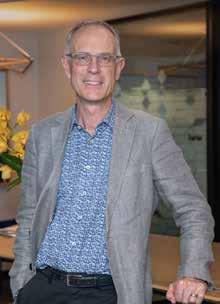
Frazer Barton
Frazer Barton – New Zealand Law Society | Te Kāhui Ture o Aotearoa
The 33rd President of the NZLS | Te Kahui Ture o Aotearoa had been in the job less than a week when interviewed. With his extensive governance experience both within and outside the Law Society, Frazer Barton’s philosophy is to be involved and “just step up if you think you can add value to the role”. Frazer feels a sense of responsibility to the profession and a strong desire to give back from what he sees as a privileged position as a senior member of the legal community.
With 16,000 members, each with their own opinion –and the ability to express it, Frazer’s greatest challenge is to ensure the oars are all pulling in the same direction, since many of the issues faced are common to the entire profession. “There are big challenges out there for our profession, so there is a need to be united and make sensible, well-thought out decisions, and execute them. We have a lot of talent to draw on, with a lot of energy and deep commitments.”
Frazer has plenty of advice for others considering a leadership role. Build up to a presidency through lower level governance positions; have an excellent support structure at work and home; keep an open mind and listen so you can extract the best from all around the table, not just the noisy ones. “When you have truly listened, you can synthesize from each and put a solution together. This encourages buy in and a sense of collective responsibility from your team.”
When asked about the current challenges he sees for the profession, Frazer had a list, and this became a somewhat common refrain among all interviewed. Access to justice, upholding the rule of law, ensuring diversity in the sense that the profession must reflect society. He also sees change on the horizon with new practicing structures and ways to supply legal services. But the biggest challenge in his term so far, Frazer quips, has been coping with the hundreds of congratulatory email messages!

Arti Chand
Arti Chand – Pacific Lawyers’ Association
The Pacific Lawyers’ Association (PLA) would ideally have two presidents, one male and one female. However one of the challenges the PLA faces is that there are more female than male members, and so Arti Chand finds herself sole President. With a solid background in NZLS leadership roles, Arti has a broad understanding of the wider profession which she finds very helpful in her current role.
When asked to take on this presidency, Arti faced a dilemma. She had recently decided to step back from the heavy time commitment of board roles to focus on her practice. Her decision fell on the side of service to the Pacific people in the profession, the place she feels most connected.
With its young and enthusiastic executive, the PLA is just 21 years old and has a lot going on and a lot to achieve. “There’s so much brilliance coming through the ranks; this is such a positive role.” The PLA is, according to Arti, a true home to Pacific lawyers where the issues they face are addressed squarely. “With only 500 of us in New Zealand, we are vastly underrepresented in the profession. Our greatest challenge is to fix the pipeline, starting at high school – our people are often the first in their family to go to university, let alone study law.”
Her advice? “Clear your diary and learn to prioritise. There’s a lot to do and you can’t do it all, so focus on what benefits members most.” Arti gets a lot of ‘soul’ out of her role. “Not all governance roles are like this – the PLA’s focus is on the wider Pacific community. We are in high schools, we support Pacific law students, we are on Pacific radio – we have true grass roots community involvement. We are all about family, support and service.”
In Pacific culture, service is the core path to leadership. Arti believes it is essential to remind yourself why you are there – to help members achieve what is best for them.
“The profession faces a huge challenge in terms of its composition. Alongside addressing current issues of racial profiling in the court system, this means acknowledging different cultures and ensuring growing populations feel they belong in the profession. In the next 20 years we will see 30% of the population Māori and Pacific, and 35% Asian. At the moment, only 10% of lawyers are Asian, and there are no Pacific KC or High Court judges.”
Arti is a woman with a mission to change the status quo and help the profession to move with the times. Watch this space.
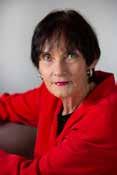
Marie Dyhrberg KC
Marie Dyhrberg KC - Auckland District Law Society
Marie Dyhrberg KC completes her three year term at the ADLS in March 2023. Committed to the criminal justice system and a well-known leader, Marie sees her current role as a natural transition from the Criminal Law Committee and the ADLS Council.
“I had no hesitation taking on this role; there’s a job to be done. If I have spare time I fill it, whether with Netflix or committee work, but I have high energy and do like to be involved.” Taking the helm of any organisation or committee is a personal challenge, and Marie thrives on gathering a group together and making change, leaving any leadership role with a path to the future and the satisfaction of knowing she has made a difference.
The most difficult aspect of leading a team –particularly a team of volunteers – is to keep the balance between motivating and overworking. Marie believes it is essential to create a sense of unity and a single purpose, which of course means high level juggling, monitoring everyone’s contribution and ensuring an open door should issues arise. “You must allow for humanity. It’s a great challenge and very rewarding.”
From a personal perspective, Marie says, “As soon as you think you know it all, you are doomed. I always ask myself what I would like if I was on the receiving end. It’s common sense really.” Her advice to others taking on a leadership role is to be very careful about doing things behind the scenes or off the record. Be open and honest, especially if things are not going well. “But the main thing is to enjoy it, take time for humour and goodwill amongst committee members.”
“To be seen as a leader, you must behave like one, and that means looking and acting professionally. If you are not sitting at the head of the table and not seen by the group and as leader, you’ll never achieve what you want. There’s no harm in getting out-voted but be prepared to either persuade or reassess your own thinking. And don’t take anything personally.”
Like others, Marie believes listening and involving all committee members is key to being an effective president.
Marie ardently hopes the profession holds on to the good that came out of Covid-19. “People learned a lot about themselves and how they work. They learned new skills and the value of socialising and being with other people. They realised how important it is to rely on each other and be aware of how others are coping. This more humane approach is something to value and nurture.”
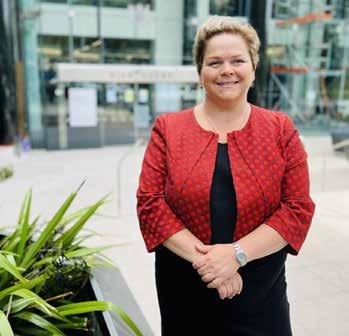
Elizabeth Hall
Elizabeth Hall – Defence Lawyers Association | Te Matakahi
The baby among legal organisations in Aotearoa, the DLA was only established in 2020. Current CoChair Elizabeth Hall’s passion for the DLA and for the people at the defence bar is immediately evident. “I worry furiously about what would happen if we did not have a strong and robust criminal defence bar. The work is acutely difficult and comes with distinct pressures, and that is the driving force behind the establishment of the DLA.”
With six children and a busy practice, one might wonder where Elizabeth finds the energy for this added burden. “Proactive by nature, I could see how I could add value in a bigger way than just looking after my own cases.” Elizabeth is immensely proud of what has been achieved in such a short time, believing the DLA will strengthen the profession overall which is, of course, integral to how the legal community operates. “To protect human rights, you need a strong defence system.”
This “idea drenched” organisation reimagines how legal associations can work. The DLA is responsive and reactive, already holding exceptionally well-attended conferences solely focusing on meeting the needs of criminal defence lawyers. There is no conference fee, just koha. If someone can’t afford to attend, they get help. They operate a buddy system so young practitioners learn from the experience of others. The tensions for practitioners which the DLA is working to address include marrying obligations to practice, family and self, given the extraordinary expectations on practitioners at the defence bar. Elizabeth believes in the importance of building and maintaining professional relationships and supporting those around you.
Liz's advice for future DLA Presidents is to remember why the organisation was founded, the underlying philosophy and ethos. “Anyone filling this role will need to be decisive and to show leadership, know when to consult, and of course time management.” With her seemingly infinite capacity and passion, Elizabeth feels protective and concerned for the future of the defence bar with its relatively poor financial rewards and relatively great pressures. “There’s only so much people can take.”

Baden Vertongen
Baden Vertongen - Te Hunga Rōia Māori o Aotearoa | Māori Law Society
Baden Vertongen states he was “voluntold” to take on the role of Tumuaki Tāne, the male CoPresident of Te Hunga Rōia alongside Renika Siciliano. He has held governance roles prior to this but admits to being intimidated by this role; having such respect for the Rangatira of the Māori legal profession who had gone before, he just didn’t think he could do the role justice. Baden’s “imposter syndrome” is a common refrain in this area of the profession.
Acknowledging the challenge of being the voice of such a diverse group, Baden treads a delicate line while also providing space for everyone to have a view. “I am very conscious of not placing too great a burden on any one individual, but the reality is that there are just not that many of us.” It’s also proven to be something of a challenge working this commitment around his sole practice. Noting how easy it is to narrowly focus on one’s own practice niche, Baden relishes exposure to other parts of the profession that this role has given him.
As the year has passed, Baden’s imposter syndrome has faded. His advice to others is that you can do it. “There are all sorts of amazing people involved who are there to help. They want you to succeed. You don’t have to do it all and you shouldn’t – if you need help, just ask.” Baden has developed his ability to be open to the different perspectives of everyone he deals with, noting that each person comes from a particular personal place on each issue.
Baden is deeply immersed in the challenge of growing an indigenous Aotearoa legal system that incorporates both western legal traditions and tikanga Māori. “Young Māori law students coming through need a profession where they feel at home and supported, and where they will stay. It’s not currently a place that encourages growth, with our young people having to climb over hurdles at every step – getting into law school, getting a clerkship, moving through the ranks. Te Hunga Rōia was set up to provide this support and pave a way for them to get through and succeed.”
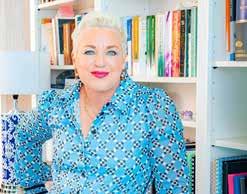
Kate Davenport KC
Kate Davenport KC
In accepting the challenge to be President of the NZ Bar Association | Ngā Ahorangi Motuhake o te Ture in 2016, Kate Davenport KC saw her chance to be involved in the profession and to do what she could to bring about effective change.
And in 2019, there was unimaginable change. Where once there was territoriality, the pandemic forced close collaborative connections among legal organisations all working to keep the justice system operating during lockdowns. “It was frustrating, and sometimes very sad, but it was a privilege to be involved at a time when the profession pulled together in ways not previously seen before.”
“It’s my belief that the legal profession will never be the same; we will never have this experience again. A poignant moment for me was writing a Bar Association newsletter full of advice and encouragement for members, knowing we were all in this together, all working through the same huge challenges in every area of our practice and life – balancing family with working from home, adopting new means of communication and technology, isolation and frustration.”
“Recognising your own shortcomings is a lifelong lesson, brought to the fore in a role such as this. My advice to others stepping into a leadership role is simply to enjoy it; you will never get this time again.” Observing how hard others work towards achieving organisational goals was eye opening. “Jacqui Thompson, for example. She just gives it her all, but others don’t observe this, and so don’t necessarily appreciate the effort.”
“These positions are time consuming and the work seemingly never-ending, but if you are doing it out of passion for the profession, have the ability to delegate and take responsibility, and of course a sense of humour, they are incredibly satisfying.”
Kate also spoke of the pressures on the justice system caused by societal pressures, and that those most in need of legal services are the least able to afford it. “This need will only increase, so the challenge is to find innovative ways to deal with it and ensure the legal profession is available to everyone, not just those who can afford it.”
Known forever as “the Covid President”, when stepping down from her position Kate describes a melancholy moment as she handed over the reins to Paul Radich KC and settled back into her normal working life, aware she would likely not be in this privileged position again.
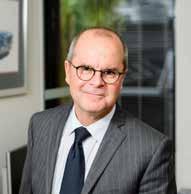
Paul Radich KC
Paul Radich KC – NZ Bar Association | Ngā Ahorangi Motuhake o te Ture
When it came to accepting the role of President of the New Zealand Bar Association | Ngā Ahorangi Motuhake o te Ture, Paul Radich KC looked back on his three decades of solid legal work and decided it was time to put his head above the parapet and look more broadly at the profession as a whole.
Paul relished the opportunity to address real issues facing practitioners: legal aid, access to justice, diversity. From the NZBA council table, he had seen the differences that could be made and thought just maybe he could make a difference himself.
He quickly became master of his calendar. There was no time to ponder, and time took on a whole new dimension. “You learn that you have to make decisions quite quickly. At the start, it takes time to formulate views and how to go about it, but you soon learn that you need to make judgment calls frequently and back yourself to express them. I found myself on the spot all the time, and just got familiar with that.”
Reminding himself daily that he was doing it for the issues and at a time in his career when he could immerse himself in the profession in ways he could not have done earlier, the most challenging aspect of the role was to accommodate and reflect the desires and views of a diverse membership – “that’s particularly hard when dealing with lawyers!” Genuinely getting value from the disparate views, often changing his own perspective through the process, he found the shared experience of enabling a consensus enormously rewarding. “It really helps to have the ability to bring people along with you, so you are doing it together, all on the same page.”
Paul believes one of the biggest challenges facing the profession is the legal aid crisis where practitioners are leaving the scheme because it’s simply too difficult and unrewarding to work within, meaning we are still a long way off reflecting a system which really provides access to justice. Another barrier to justice currently being addressed by Justice Goddard is the advance in technology and how that has affected the cost and time involved in discovery.
The final challenge Paul raised was the need to address diversity. “The Bar Association has done significant work towards gender equitable briefing in our senior bar but there’s a lot more to be done here in cultural diversity, again in senior positions such as KC and the bench.”
The most significant and moving event for Paul in his tenure was the gifting ceremony of the Bar Association’s te reo name - Ngā Ahorangi Motuhake o te Ture. The NZBA and Paul personally strive to incorporate te ao Māori and this was a symbolic and substantive part of making great strides in that area.

Tiana Epati
Tiana Epati - New Zealand Law Society | Te Kāhui Ture o Aotearoa
It would be surprising if Tiana Epati emerged emotionally unscathed from her tumultuous term as President of the NZLS, and she admits to a wide range of emotions. Alongside relief and complete exhaustion, Tiana misses connection with close colleagues but is thrilled to be able to enjoy time with her family, for the first time in three years.
As a Pacific Island woman practising law in a small town, Tiana saw the presidency as an an opportunity to address issues she had faced. Just perhaps, she thought, it was time. Her aspirational plan set out three clear strategic pillars. Health and wellbeing, communication, and access to justice.
Stepping into the role as the #MeToo crisis in the profession was unravelling, Tiana spent the next year on the road every day delivering speeches and attending more events than any other President had, pulling the NZLS out of that low. This crisis had been a motivating factor for Tiana to take on this demanding role, having first-hand experience of many of the issues presented.
The pandemic then required 100% focus to work out how to keep the courts functioning and managing the IT implications for communication across the legal community, forcing the legal world into a more technologically savvy state and paving the way for wider tech improvements in the justice system. The pandemic also presented another health and wellbeing crisis, somewhat ironic as Tiana unexpectedly discovered she was pregnant.
As the pandemic raged, Tiana spent countless hours on yet another crisis – legal aid. Carting her new baby around to meeting after meeting, she launched a big campaign to address legal aid rates. While the result was not quite what was hoped for, Tiana believes this campaign was her greatest achievement as President, working closely with presidents of other legal organisations, developing cohesion and common purpose across the industry.
Reflecting on her time as President, Tiana learned her capacity for challenge is greater than she anticipated –as evidenced by having a baby mid-term. She counsels people to reach out for help if they are struggling. She received strong support from her team, from her ally Paul Radich KC, and others among the profession such as the then NZBA President Kate Davenport KC, with whom Tiana worked closely.
“Leadership is not as easy as it looks, and it gets hard very very quickly. The issues to be addressed must be fundamentally at your core to be able to keep going when being hammered by everything. The goal for me was to leave the profession in a much better place than when I came in, and that’s what kept driving me forward.”
Tiana believes the key challenge for the NZLS will be to maintain the momentum of change in legal aid and access to justice. A second, no less important challenge, will be to continue to work closely and collaboratively with professional organisations like the NZBA as was developed through the pandemic.
Talking about the legal aid crisis on Radio NZ, Tiana had senior members of the criminal bar contact her to say they sat in their cars and cried as they listened –finally, someone was listening. She had been given the opportunity and she took it.
Conclusion
So there you have it. These presidents, past and present, share common goals for the future of the profession. They value the good that Covid brought about while digging deep to work through a crisis. And they all share a passion for the profession and for their particular organisation, without which their roles would be so much more difficult.
* Barbara Relph is a freelance writer and proof-reader –www.barbararelph.com







